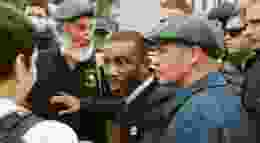
Where does Britain really stand as a nation as we move in 2022?
With division seemingly rife in British culture, most recently manifesting itself in the debate over the toppling of Edward Colston's statue, Alexander McKibbin attempts to assess where Britain currently stands as a nation.
As the strains of Auld Lang Syne fade into the air, festive decorations come down, and the euphoria of New Year's Eve is replaced by the pervasive melancholy of reality, it is perhaps, an opportune moment to pose the question, "Where are we now?"
By that, I mean, as a nation.
When The Prime Minister ventures outside the confines of Westminster on one of his innumerable jaunts to factories and other workplaces, what does he see, and more pertinently, comprehend? Is there a flicker of recognition as to how the population at large feel currently?
Whilst the Prime Minister lapses, all too easily, into Churchillian rhetoric, larded with Latin idioms, accompanied by a buffoonish smile and Wooster bonhomie, is he conscious of the visceral and swelling unhappiness that is swirling unchecked throughout the land? The Covid emergency might have gifted him the opportunity to burnish his war time metaphors and implore the populace to strive, as a community, to defeat the enemy. Yet is there really a cohesive "community" as such anymore, and if there is, is it one that would obey his increasingly vocal pleadings?
How is it that Britain, a country with a long and proud history of humanity, discoveries and enterprise, that have largely benefitted the world, has now become such a divided and angry body? To say that Britain is fractured would be an understatement. A cursory journey into the world of online comments boards, reveals levels of vitriol and hatred that simply beggar belief.
On any given issue, politics, the economy, the environment, sexual orientation, animal rights, religion, and immigration, there exists in cyberspace, and therefore presumably within the community, an ever-primed army of individuals, ready to take offence, and heap unchecked, bucketsful of opprobrium on those whose views do not coincide with their own.
Taking offence (in some cases, over the most inoffensive issues) has become a hair trigger industry, whose output consists primarily of illogical and intemperate bile. Reasoned debate, intellectual rigour, logic and alternative viewpoints – once the hallmark of a balanced and successful culture, are no longer part and parcel of the self-loathing society that we have become.
Today, universities unhesitatingly and unquestioningly quail to Students Unions' increasingly bizarre demands, editors willingly spike "inappropriate articles", film directors steer clear of anything remotely contentious, authors tiptoe warily through the minefield of grievance, all fearful of unexpectedly detonating hidden ordnance that will destroy their careers in the blink of an eye.
It is astonishing, that in a world where knowledge has never been more easily accessed, and more importantly, where history and its vital lessons, can be so comprehensively learned, that we find ourselves prisoners in a cul-de-sac of revisionism, blind to the consequences of our own hubris.
In 2001 the Taliban destroyed the shrine at Bamiyan in Afghanistan which was the location for the two largest standing statues of Buddha in the world. The world watched on, appalled that this could happen, yet here we are in the west, two decades on, busily engaging ourselves in a similar orgy of reinterpretation. That is not, I hasten to add, comparing the removal of statues here in the UK and elsewhere to Bamiyan, yet there is undeniably a subtle parallel.
The modern, unquenchable desire to erase anything that is now deemed deplorable or offensive, the removal of "problem" books from libraries, the installation of safe spaces, the confetti like sprinkling of trigger warnings and the attendant parasitic industry that this intolerance has spawned, are developments that anyone with a passing care should be extremely troubled by.
By denying free speech, a cornerstone of a free and democratic society, we are screwing closed the safety valve that has served us well for centuries.
Are today's students (tomorrow's leaders), now so comprehensively denuded of their critical faculties through relentless yet subtle indoctrination, that they really are genuinely frightened of being confronted with Orwell's prose in 1984?
Google "list of books with trigger warnings", and you will be richly rewarded with numerous websites; dedicated to helping readers feel more prepared, better informed, and safer with their books. This is a sad juncture which begs the question, if future generations are incapable of learning from history without needing to be molly-coddled, is Britain and the western world heading blindly into an abyss, fashioned knowingly by a conniving media?
The more one is assailed by legislation and pious guff from a variety of organisations, all promising us a happier and more harmonious society, the more one feels that the fault line dividing society is getting wider and deeper by the day.
Having got Brexit out of the way, it was incumbent on the Government to strive heroically and tirelessly to repair community divisions and heal wounds. What we have got now is more divisive and harmful rhetoric under the cloak of "protection" from Covid. Far from a "community" we have become a fractious nation, happy to do one another down when the opportunity presents, egged on by a supplicant and mendacious media.
As we enter another year of uncertainty, never has the gulf between the elected and the electorate seemed quite so cavernous and quite so unbridgeable.
To answer, "where are we now?" I would venture to suggest, we are in a worrying and unpredictable place. We are living through momentous and hugely consequential upheavals that will reverberate for generations to come, the problem is that sadly, most people simply cannot recognise it.














